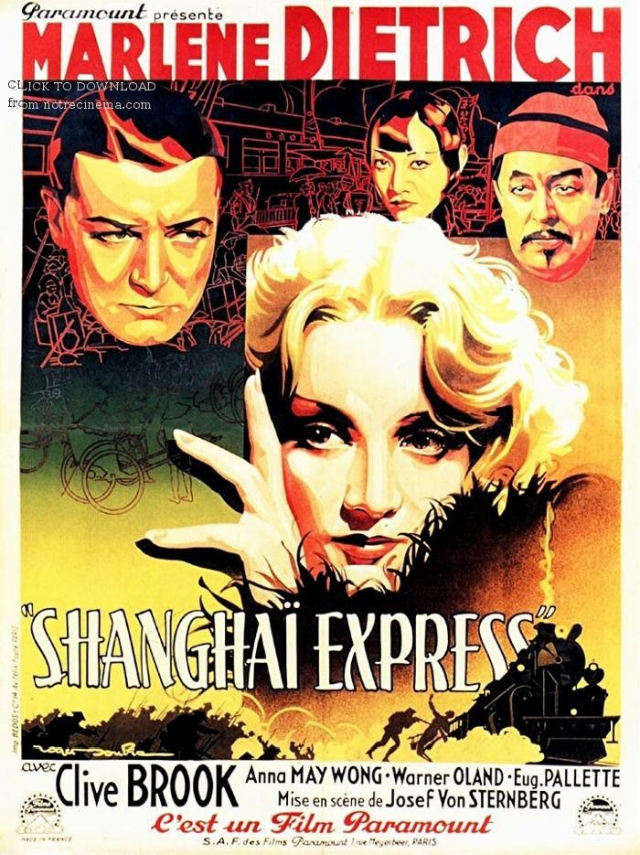Written by Jules Furthman, Harry Hervey (Story)
Starring Marlene Dietrich, Clive Brook, Anna May Wong, Warner Oland, Lawrence Grant, Eugene Pallette, Louise Closser Hale
IMDB Entry
Back when I was in college, I stumbled upon Andrew Sarris's The American Cinema, his critical listing of film directors*. He put them into categories and the top group were called "Pantheon Directors." Of the directors, the one I saw the least of was Joseph von Sternberg, so I decided to check him out with Shanghai Express.
A varied group of people get onto the train that gives the film its name. Shanghai Lily (Marlene Detrich) and Hui Fei (Anna May Wong) are prostitutes, and Lily -- real name Madeline -- had a past love affair with another passenger Captain Donald Harvey (Clive Brook). Also on the train is the mysterious Chinese merchant Henry Chang (Warner Oland); the Reverend Carmichael (Lawrence Grant), who strongly disproves of Lily and Hui Fei; Sam Salt (Eugene Pallette), and American gambler; and the fussy Mrs. Hagerty (Louise Closser Hale).
The movie introduces the character with typical 30s efficiency -- a few lines of dialog, a reaction and after a few snags, the train is stopped by revolutionaries, who demand the return of one of their own. The leader threatens to kill Captain Harvey and Lily is forced to bend to his demands.
Prostitution is front and center in the story, a sure sign this was pre-code.
Dietrich is superb. Hard on the outside, but soft inside, especially where Harvey is concerned. You can see her vaunted sex appeal in every frame. Clive Brook is fine, though clearly doesn't have the star quality of Dietrich. Eugene Pallette had the most recognizable voice of the era and Louise Closser Hale is great comic relief as someone who never really grasps they're not in the US any more. Werner Oland is, of course, best known for his Charlie Chan film, but it's interesting that the fact he is not Chinese is explained by saying he is half a westerner. Anna May Wong cornered the market on playing Chinese women in this era**
Writer Jules Furthman was a very successful Hollywood screenwriter, with credits for Bogart films To Have and Have Not and The Big Sleep, as well as Only Angels Have Wings.
__________________________________________________________________
*Sarris was known for furthering the auteur theory -- that the director is the creative force behind a film. People often oversimplify what he was saying and don't really get what he meant by it. They often criticize The American Cinema by its categorizing various European directors as "Fringe Benefits," supposedly implying they aren't all that important. But Sarris was clear that since the book was about the American cinema, these directors -- who mad a few Hollywood films, but not as their primary output -- were outside the scope of the book.
**She was Chinese-American.

No comments:
Post a Comment